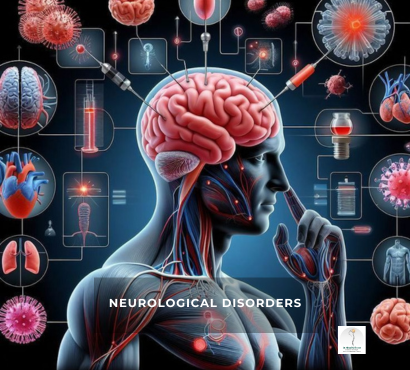The human brain and nervous system are incredibly complex, controlling everything from movement and sensation to memory and emotions. When something goes wrong with the nervous system, it can lead to serious health issues affecting the brain, spinal cord, and nerves. This is where neurologists come in.
A neurologist is a medical specialist trained to diagnose, manage, and treat disorders of the nervous system. From migraines and epilepsy to stroke and Parkinson’s disease, neurologists play a crucial role in maintaining brain and nerve health.
In this article, we will explore:
✔ The role of a neurologist
✔ Common neurological conditions they treat
✔ When to see a neurologist
✔ Diagnostic tests and treatment options
Who is a Neurologist?
A neurologist is a medical doctor who specializes in the diagnosis and treatment of brain, spinal cord, and nerve disorders. They undergo extensive training in identifying neurological diseases and providing specialized treatments, often working with neurosurgeons, physiotherapists, and rehabilitation experts.
Unlike neurosurgeons, who perform brain and spine surgeries, neurologists primarily focus on non-surgical treatments such as medications, therapy, and lifestyle modifications.
What Conditions Does a Neurologist Treat?
Neurologists treat a wide range of neurological disorders, including:
1. Headaches & Migraines
✔ Tension headaches, cluster headaches, and migraines are some of the most common neurological issues.
✔ Symptoms include throbbing pain, sensitivity to light, nausea, and dizziness.
✔ Treatment includes pain relievers, lifestyle changes, and stress management.
2. Epilepsy & Seizures
✔ A neurological disorder characterized by recurrent seizures due to abnormal brain activity.
✔ Seizures can cause uncontrolled movements, confusion, and loss of consciousness.
✔ Treatment includes anti-epileptic drugs (AEDs), dietary therapy, and, in some cases, surgery.
3. Stroke & Its Aftereffects
✔ A stroke occurs when blood supply to the brain is interrupted, leading to brain damage.
✔ Symptoms include sudden weakness, slurred speech, facial drooping, and loss of coordination.
✔ Immediate treatment involves clot-dissolving medications or surgery, followed by rehabilitation therapy.
4. Parkinson’s Disease
✔ A progressive disorder that affects movement due to low dopamine levels in the brain.
✔ Symptoms include tremors, slow movements, stiffness, and difficulty with balance.
✔ Treatment includes medications, physiotherapy, and in some cases, deep brain stimulation (DBS).
5. Multiple Sclerosis (MS)
✔ An autoimmune disorder where the immune system attacks the protective covering of nerves.
✔ Symptoms include fatigue, numbness, vision problems, and difficulty walking.
✔ Treatment includes immunosuppressants, steroids, and physiotherapy.
6. Alzheimer’s Disease & Dementia
✔ Progressive neurodegenerative diseases affecting memory, thinking, and behavior.
✔ Symptoms include confusion, personality changes, difficulty recognizing people, and memory loss.
✔ While there’s no cure, medications and cognitive therapy can help slow progression.
7. Neuropathy & Nerve Disorders
✔ Peripheral neuropathy occurs due to nerve damage, causing pain, tingling, and numbness.
✔ Common causes include diabetes, infections, and vitamin deficiencies.
✔ Treatment includes nerve pain medications, lifestyle changes, and physical therapy.
8. Brain & Spinal Cord Injuries
✔ Traumatic brain injury (TBI) and spinal cord injury can cause paralysis, memory loss, or cognitive impairments.
✔ Neurologists help in rehabilitation and recovery.
9. Sleep Disorders
✔ Insomnia, sleep apnea, restless leg syndrome, and narcolepsy are linked to neurological dysfunction.
✔ Treatment includes sleep therapy, medication, and lifestyle changes.
10. Movement Disorders (Ataxia, Dystonia, Tremors)
✔ These disorders affect balance, coordination, and voluntary movements.
✔ Treatment includes medications, physical therapy, and, in some cases, surgical intervention.
When Should You See a Neurologist?
Consult a neurologist if you experience:
✔ Frequent or severe headaches/migraines
✔ Numbness or tingling in the hands, legs, or feet
✔ Memory loss or confusion
✔ Uncontrolled tremors, movement difficulties, or balance issues
✔ Seizures or blackouts
✔ Sudden weakness or paralysis in any part of the body
✔ Chronic pain that doesn’t improve with treatment
Early diagnosis and treatment of neurological conditions can prevent complications and improve quality of life.
How Does a Neurologist Diagnose Neurological Disorders?
Neurologists use several diagnostic tests to evaluate brain and nerve function, including:
1. Neurological Examination
✔ Assesses reflexes, muscle strength, coordination, and sensation.
2. Imaging Tests
✔ MRI (Magnetic Resonance Imaging) – Provides detailed images of the brain and spinal cord.
✔ CT Scan – Detects strokes, tumors, and brain injuries.
3. Electroencephalogram (EEG)
✔ Records brain activity to diagnose epilepsy and sleep disorders.
4. Electromyography (EMG) & Nerve Conduction Study (NCS)
✔ Evaluates nerve and muscle function to detect neuropathy.
5. Lumbar Puncture (Spinal Tap)
✔ Helps diagnose infections, multiple sclerosis, and brain hemorrhages.
Treatment Options for Neurological Disorders
Depending on the condition, treatment may include:
1. Medications
✔ Pain relievers and muscle relaxants for headaches and neuropathy
✔ Anticonvulsants for epilepsy
✔ Dopamine agonists for Parkinson’s disease
2. Physiotherapy & Rehabilitation
✔ Helps restore mobility and strength after stroke or brain injury.
3. Lifestyle Modifications
✔ Healthy diet, exercise, and stress management help manage neurological disorders.
4. Surgery & Advanced Treatments
✔ Deep brain stimulation (DBS) for Parkinson’s disease
✔ Brain surgery for tumors or epilepsy treatment
Neurologists are essential for diagnosing, treating, and managing disorders of the brain, spine, and nervous system. From headaches and epilepsy to stroke and movement disorders, their expertise ensures proper care and treatment for various conditions.
If you experience persistent neurological symptoms, consult a neurologist for early diagnosis and intervention. Your brain health matters, and seeking timely medical attention can prevent long-term complications.
FAQs
1. What is the difference between a neurologist and a neurosurgeon?
✔ A neurologist treats brain and nerve disorders with medications and therapies, while a neurosurgeon performs surgeries on the brain, spine, and nerves.
2. Can neurological disorders be cured?
✔ Some neurological conditions like migraines and mild neuropathy can be managed effectively. However, chronic conditions like Parkinson’s and Alzheimer’s require lifelong management.
3. How can I keep my brain and nervous system healthy?
✔ Eat a nutritious diet, exercise regularly, manage stress, avoid smoking/alcohol, and get enough sleep.

